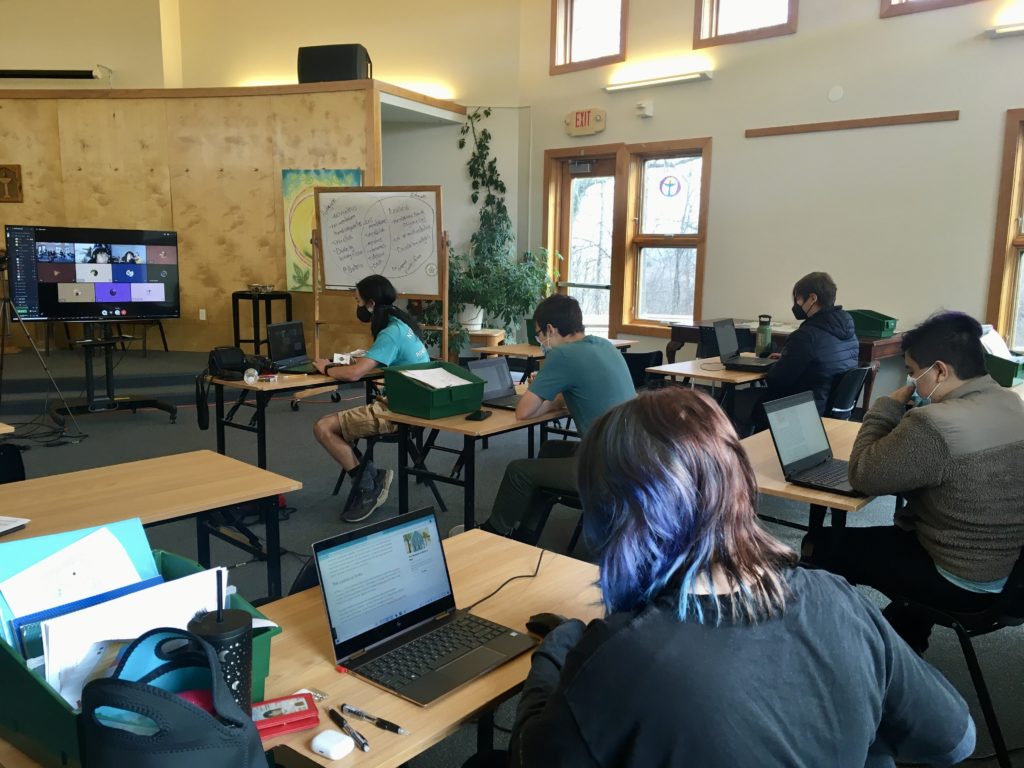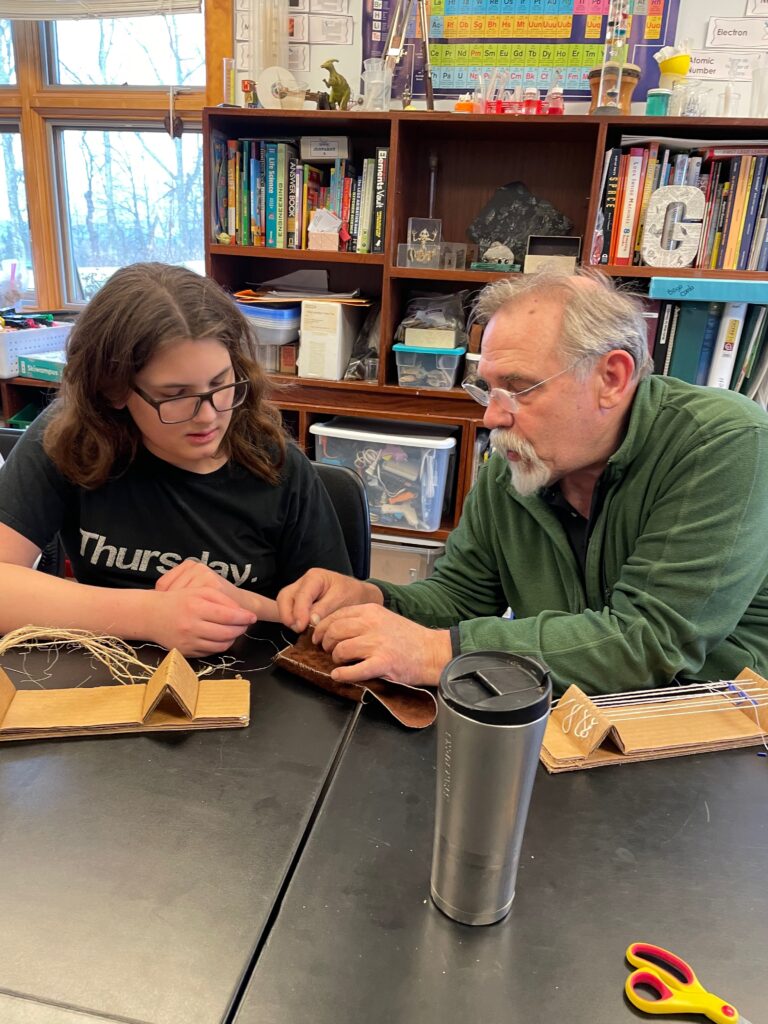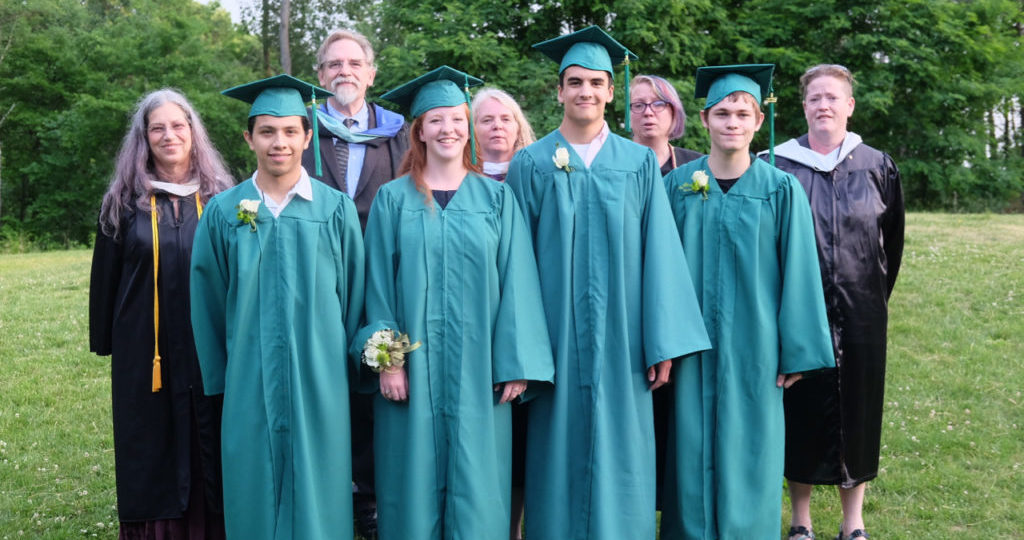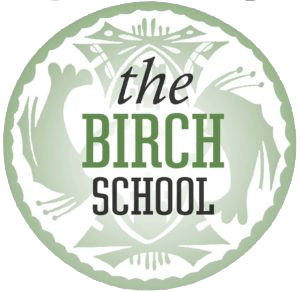Frequently Asked Questions
What are the options for attending The Birch School?
Students can enroll in The Birch School on a Full-time or Part-Time basis. The full school day for students is from 8:45 – 3:10. Classes begin at 9:00 and students arrive between 8:30 and 8:50 am. Full time students are enrolled in school. Part-time students are homeschoolers who attend 4 half days, and who participate in classes that support their homeschool program. The half day program ends at 12:15, and students are welcome to stay for lunch until 1:00 as space allows.
We are currently serving students who range in age from grades 6 to 12. (ages 9 -18 Academically advanced 5th graders will be considered)
Birch has rolling admissions, meaning students can enroll at The Birch School at anytime during the school year, as space allows, following a successful visit, meeting with Director, and introductory trial period.


How does the program work?
Students work closely with teachers and mentors to meet their educational goals. At the start of the school year, educational goals are outlined. Parents, students, and Birch School teachers meet during Academic Planning and Student-Led Conferences. Students’ activities include individual academic assignments, hands-on project-based learning, team-building and outdoor adventures. Mornings are spent primarily working with teacher-led classes, and in small groups, with some independent work. Afternoons are generally for hands-on classes and collaborative project work. Each student follows their own individualized schedule.
Fridays are remote: we meet online for all-school meeting and then individually and in small groups for advisory with teachers. Students are assigned independent work to be completed on Fridays.
What kind of Diploma will my student earn if they complete the graduation requirements of The Birch School program?
When students complete their planned program, meet learning goals in a variety of subject areas, and complete a Senior Capstone Project, they earn a Private School Diploma from The Birch School; a “Local” diploma. Our goal is for students to leave The Birch School ready for whatever they choose next. We ensure that students have earned credit in each of the required subject areas so that they meet the admission requirements for colleges they may want to apply to. Students also have develop portfolios of their work that they can use to demonstrate their learning and accomplishments.
Students must be enrolled full-time in High School to earn a Birch School Diploma. Part-time attendees can be homeschoolers and still depend on the support that The Birch School can offer.

We take guidance and inspiration from all of those models, but we strictly follow none of them. This permits us to be flexible and responsive to students and families. While we do take a similar approach to a Sudbury or Democratic School, we provide more structure and learning tools for students, and ask students to map out a plan to reach their learning goals, in cooperation with teachers and parents. When students come to Birch, we ask them to agree to shared learning goals. Defining and outlining those goals, as well as creating a flexible plan to meet those goals, is part of the process. We help students to become independent learners and engage with learning materials successfully, similar to Montessori approach. We empower and honor students to take responsibility for the learning community, similar to a Free School.
Among the values that guide us are the principles of ecology. First, diversity equals strength: the more diverse an ecosystem is, the stronger it becomes. Second, ecosystems promote diversity spontaneously. Unique individuals arise by surprise out of reality and their unique qualities strengthen our community. What this means for your child is that we nurture each student’s unique character – that is our central mission and concern.
We meet together as a whole school on a regular basis. All-school community meetings are on Wednesday and Friday.
We use a “talking stick circle” to include all community members in discussions and decisions about school. We are conscious to ensure that everyone is included and can contribute to the community. Our virtual meetings on Fridays follow a similar format, in which we are careful to include every student in the conversation.
We schedule community-wide special events, such as special brunches, friendly contests and raffles, presentations, book clubs, and more.
Full time students are considered enrolled as students in a private school.
Part-time students are considered homeschoolers, and parents are responsible for overseeing their academic progress, record keeping, and reporting to their home school district on a regular basis as per homeschool regulations.
Assistance with homeschool reporting paperwork is available on an hourly basis. We welcome students of all alternative learning models. More information here.
When students are freely and willingly engaged in their educational goals, we consider that to be self-directed learning. By matching student skills, desires and interests with particular learning tools, students can work towards their goals with enthusiasm and pleasure. Each student’s path is different, and their learning plan and goals are decided together by the parent/teacher/student team at the beginning of each quarter. The parent/teacher/student team agrees that the work plan mapped with teachers and parents is reasonable and attainable. Students agree to devote the time to the learning plan, and work daily to maintain progress in all areas.
We offer a mixed balance of adult initiated and student initiated projects and learning experiences. As students spend more time at Birch they “learn how to learn” and move from more teacher-directed learning to more student-directed. Our core morning programs are primarily teacher-led and paced by teachers, with opportunities to customize the individual work that each student engages with.
We have divided the school year into two parts, consisting of 5 major learning periods, called terms. Students participate in scheduled classes, workshops and independent studies each term. Twice per year time for students prepare for Student-Led Conferences and the Showcase. The Showcase a time of reflection on, and recording of, work done for the previous term. Parents, grandparents, siblings, friends, are all invited to attend the evening showcase. For full-time students we also host student-led conferences and parent/teacher meetings anytime by request.
Students, in partnership teachers and parents, outline learning goals at the beginning of the school year. These goals are spelled out, and progress is mapped.
Students frequently utilize adaptive online learning tools that provide individualized learning paths, and keep track of accomplished skills and mastery. This allows teachers to monitor student growth in real time, across subjects and
Each student has a record of their classes and projects using our online community information system. Students, parents, and all teachers have access to the chosen recording and tracking tool.
Twice a year the school hosts a Student Showcase. The school community gathers to see student work and presentations either for a virtual presentation or in-person. Projects and accomplishments are displayed and shared. Students solicit feedback on their work, and often gather ideas for further study from others in the group. A website is created and student work is published for everyone to see. When possible, an in-person event is offered. Refreshments are shared, and parents and family members celebrate the hard work of the previous period.
Our program is integrated as much as possible, so learning is constantly happening across disciplines. We spend each morning on the core subject areas – English language, Social Studies, Science and Math. Our morning schedule rotates between those core subjects in approximately 45 minute periods Monday – Thursday, with Friday focusing on independent work. Teachers and coaches review each student’s work, to ensure engagement with all of the necessary areas, including math, science, history, reading, writing, and problem-solving. When we identify gaps in subject area work, teachers build additional lessons, assignments, and independent study units for individual student needs. In many situations students can follow their own inspiration and unique trains of thought, with teacher guidance and support.
Art and music inform almost all of our activities at the Birch School. Because we approach topics in an integrated way, we include art and music in each subject.
We offer Art courses several times a week, taught by artist professionals. We also have Open Studio periods for art exploration.
There is a grand piano in the building as well as a number of digital instruments, and many students take lessons which can be arranged for individually. Pianos are also available for self-study at any time.
A full range of art supplies and craft materials are available for students to explore many art media, including painting, sculpture, fiber arts, sewing, acting, and many other options. Learning computer generated art is included for those who are interested.courses.
Music lessons are available, depending on instructor availability. Classes in beginning Guitar, Music History, and Digital Music are offered in certain semesters.
Students at Birch are “measured” in a variety of ways. We focus on authentic assessment such as written narrative, record of completed work, self-evaluations, rubrics, and multi-media portfolios.Twice a year we host a student showcase, when family and friends are invited to observe student work. Students present their work and demonstrate projects to solicit feedback from others. Students also prepare for student-led conferences.
Our program integrates a number of adaptive online tools that provide diagnostics on an ongoing, real-time basis. This allows us to use this information, combined with what we are seeing in lessons with students, to adapt all aspects of the learning experience to meet each student’s individual needs. At Birch we emphasize Formative Assessment, which gives students immediate feedback on their learning, and allows them to see their results and immediately correct mistakes. Using formative assessment, the quizzes become part of the learning process. This is distinct from high-stakes Summative assessments like the NYS Regents exam, where students never see their results, but only get a numerical score.
When it comes to traditional testing and assessment, we offer a standardized test yearly. In the early spring, we administer a universally recognized, standardized test, with the choice to opt out for those students for whom the test is not appropriate.
For older students, we offer a test-taking strategies class, which provides realistic strategies and skills to master standardized testing such as the SAT, PSAT or AP tests. For those students who have chosen to take any of these tests, we offer direct preparation. Many Birch students have taken standardized tests such as the PSAT, SAT and ACT. They have found their preparation at Birch to be completely adequate.
Currently we have our students arranged into a 5/6th and 7th group; an 8th and 9th group, and a 10th, 11th, and 12th group.. We have approximately 6 – 15 students in each group. The groupings may change each year depending on the students in the learning community.
We find that Students who exhibit some of these qualities do well in our school…
- Students who want to learn, and can accept and embrace responsibility for their own work can excel in this environment.
- Students who express their ideas in thoughtful ways, and who can learn to work together with others will be most successful.
- Independent thinkers and students who are exploring their passions are also successful at Birch.
- Students who are not afraid to fail can experiment in many directions.
- Students who are willing to partner with their teachers and academic coaches will get the most out of this program.
- Students who are open to learning group process skills and organizational management techniques can benefit greatly in a learning community like this one.
- Students who move through their work quickly and who are hungry to work at their own pace excel in this environment.
- Students who experience anxiety about school or social interactions at school often thrive in the smaller and nurturing environment of The Birch School.
Students who require personal aides, who struggle with independence, who have lots of difficulty staying on task, and who are not interested in learning are not successful at Birch. Students who fit these descriptions are not a good match for our program.
Our teachers have a variety of backgrounds working with young people in diverse environments. Some of our teachers hold NYSED Certification, some have Masters Degrees in Teaching and all have extensive experience with students. Members of our teaching team have designed and operated summer camps, after school programs, outdoor education programs, physical education programs, preschool childcare programs, computer programming and craft and sewing classes. Our teachers have experience in private, charter and public schools, traditional and Montessori classrooms, in elementary, middle, high schools, and colleges, teaching math, history, technology, english essay writing and environmental science. We feel that we have the essential mix of traditional and non-traditional, in school and out-of-school experience to meet the needs of learners in this new 21st century learning environment
All students enrolled at The Birch School are required to have their own laptop. Computers are not used all the time, but are are necessary for full participation in all class activities and assignments. Many parents ask what device might help their student, and we usually recommend a simple laptop or netbook over a tablet. .
Take a look at our Testimonials page to see what parents have to say about their student’s experiences at The Birch School.
Because each student has their own individual learning plan, we don’t have traditional “class size”. Our students are moving throughout the day from individual learning, to small and large group learning environments. Students are enrolled in classes, with different class size depending on the subject, but ranging from 3 – 20 students.
Each student has an advisor, an academic “coach”, one of the teachers at the school, who is their main teacher and who is responsible for the day to day support of that student. Each teacher at the school has an advisory group of students for whom they are responsible. Students are roughly grouped into “middle school”, and “high school”. Although work spaces and schedules are determined by the home grouping, when necessary students cross between the groups often to meet other students at the appropriate learning level.
